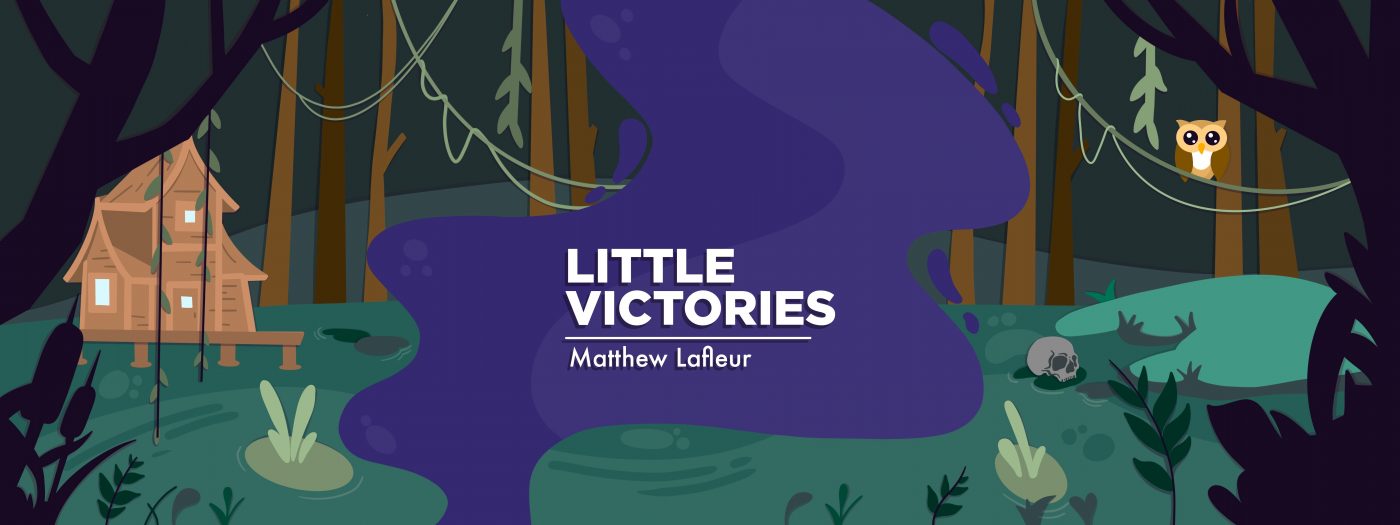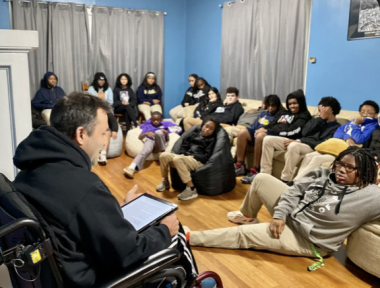The importance of resilience and other lessons from my diagnosis
Overcoming nerves, a columnist shares important life lessons with students
Written by |

As the audience gathered last week, again I asked, “Why am I doing this?” They sprawled comfortably on couches and beanbags as they waited on the slightly uncomfortable speaker: me.
My friend Loren had asked me to speak to the students at his nonprofit, Hope for Opelousas, a south-central Louisiana student-enrichment program. I said yes, of course.
I always get nervous in such talks because my diagnosis story is slightly different in each retelling, like light reflected at various angles from the same diamond. I never know what kind of reaction my tale will get.
Though speaking before groups is nerve-wracking, I’ll do it as long as I can. Here’s a lightly edited version of what I said.
My talk
When Loren asked me to give a talk to a group of students, I wondered what y’all haven’t heard a million times before.
Since I’m in a wheelchair, maybe I should talk about how I survived my health challenges, so your challenges seem smaller and easier to handle.
But screw that; I’m not inspiration porn. Instead, I want to level the playing field. Maybe you’re facing a rough relationship with your family, struggling in your classes, feeling left out in your friend group, or fighting anxiety or depression.
We all have challenges. And even when it doesn’t feel like it, you can persevere. So here’s how I try to do that. Remember, inspiring you is not my goal. Being real with you is.
My origin story
Believe it or not, I wasn’t always in a wheelchair. My childhood was probably a lot like yours. I played a lot of sports, and most of my friends did, too.
But that changed before junior high. A coach recommended I see a doctor because I couldn’t keep up with my teammates, thinking maybe the issue was flat feet.
The local podiatrist, or foot doctor, told me that although my feet were flat, there was also some imbalance in my walking. He suggested that I see a neurologist to find out why.
After going to doctors all over Louisiana, I was finally diagnosed at 9 years old, but didn’t pay attention. I assumed that whatever they found had a quick fix so I could get back to playing sports.
But after that appointment, my balance kept getting worse. By junior high, I had to quit sports altogether. Since most friendships when we’re young revolve around liking the same things, I felt abandoned by most of my friends.

Columnist Matthew Lafleur speaks to students last week at Hope for Opelousas in south-central Louisiana. (Courtesy of Ryan Mercer)
High school lows
In high school, my disease kept getting worse. I had to lean on the lockers in the school hallway to stay upright whenever I walked, so I figured that it was time to learn about whatever I had. I found its name: Friedreich’s ataxia (FA). I’d never heard of it, so I searched the internet and read that this condition affects nerves and balance and that an FA patient’s body becomes more affected with age. There were no real treatments and no cure for this.
So much for a quick fix.
I read that soon, I would require the full-time use of a wheelchair. So not only would that happen, but almost all of my independence would be taken away.
Somehow in this dark, I met a friend of a friend, with long, unruly hair. As a senior in high school, I met my forever friend Loren.
Graduating to a wheelchair
Loren was by my side at the start of college, my first day in a wheelchair. I realized that being in a chair didn’t define me; instead, it was a tool that helped me get around.
Loren taught me not to give up and still does. He reminds me there are two responses when life gets tough: We either become a victim, always complaining about what goes wrong, or we can defy the odds of whatever is set before us and come out victorious.
Resilience after college
After college, I couldn’t find a job. I blamed FA’s progression.
I finally found a position writing about life with my disorder. After a year, I joined Bionews, the parent company of this website, full time and am now its culture coordinator. I get to talk to people from all over the world with different diagnoses, and I find that we have a lot in common as survivors, as people who are resilient.
Even when life doesn’t always turn out as expected, may you persevere, may you find friends like Loren who remind you that you’re not a victim, and may you realize that you are the tool God can use to bring miracles in this world.
Be miraculous. Be resilient. The world needs that more than you know. The world needs you more than you know.
Note: Friedreich’s Ataxia News is strictly a news and information website about the disease. It does not provide medical advice, diagnosis, or treatment. This content is not intended to be a substitute for professional medical advice, diagnosis, or treatment. Always seek the advice of your physician or another qualified health provider with any questions you may have regarding a medical condition. Never disregard professional medical advice or delay in seeking it because of something you have read on this website. The opinions expressed in this column are not those of Friedreich’s Ataxia News or its parent company, Bionews, and are intended to spark discussion about issues pertaining to Friedreich’s ataxia.




Leave a comment
Fill in the required fields to post. Your email address will not be published.